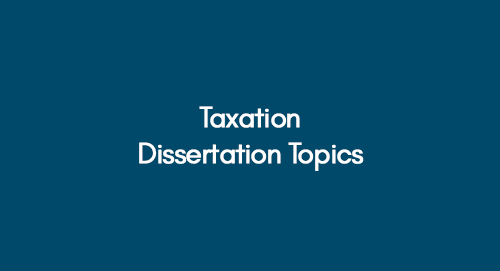
Neuroscience Dissertation Topics | Trending 135 Titles For Students
December 26, 2022
Taxation Dissertation Topics | List of 134 Interesting Ideas in 2025
December 26, 2022A psychology dissertation is a research project that explores a specific topic in psychology, using evidence and analysis to draw conclusions. If you're a psychology student struggling with your dissertation, you're not alone. Many find it one of the most stressful parts of their degree. Writing an impactful dissertation in psychology requires deep research, critical analysis, and a strong understanding of the subject.
144+ Trending Psychology Dissertation Topics in 2025
This guide explores the psychological challenges of writing a dissertation and provides tips and examples to make the process easier. Check out the psychology dissertation examples below for a better understanding.
Example: 1 The Influence of Childhood Trauma on Drug Abuse
Example: 2 Cyberbullying and Its impact on Adolescents’ Mental Health
Example: 3 Impact of Organisational Support on Employee Well-being: Role of Emotional Intelligence
5 Reasons Why Writing Psychology Dissertation is Hard
Writing a psychology dissertation is one of the biggest challenges students face in their academic journey. It requires a lot of time, effort, and dedication. Here are five reasons why it can be so difficult:
1. Extensive Research
A psychology dissertation requires a deep understanding of previous studies and theories. Students must review a large number of research papers, books, and academic journals to support their work. Finding reliable sources and understanding complex studies can be overwhelming.
2. Complex Theories and Concepts
Psychology involves many complicated theories, models, and concepts. Applying these ideas to real-world problems or research questions is challenging. Students need to critically analyze different psychological perspectives and explain them clearly in their dissertation.
3. Difficult Data Analysis
Many psychology dissertations require collecting and analyzing data, often using statistical tools like SPSS or R. Understanding how to conduct experiments, interpret results, and apply statistical methods can be tough, especially for students who are not confident in math or statistics.
4. Time-Consuming Process
Writing a dissertation is not something that can be done quickly. It takes months of planning, conducting research, analyzing data, and writing multiple drafts. Balancing this workload with other academic responsibilities and personal life can be stressful.
5. High Expectations and Academic Standards
Professors and academic institutions expect dissertations to be original, well-structured, and deeply analytical. Students must present strong arguments, provide evidence, and follow strict formatting guidelines. Meeting these high standards adds to the pressure.
7 Expert Tips to Score Above 80% in Your Psychology Dissertation
Scoring above 80% in your psychology dissertation requires careful planning, strong research skills, and excellent writing. Here are seven expert tips to help you achieve a top grade;
1. Choose a Strong and Relevant Topic
Select a topic that is both interesting and relevant to current psychological research. When you choose a topic, ensure it has enough available literature and a clear research gap that you can explore.
2. Conduct Thorough Research
A high-quality dissertation is built on strong evidence. Read extensively from credible sources such as peer-reviewed journals, books, and reputable psychology databases. Take detailed notes and organise your references properly.
3. Develop a Clear Research Question and Hypothesis
Your research question should be specific, focused, and researchable. A well-defined hypothesis or objective will give your dissertation clear direction and structure.
4. Master Data Collection and Analysis
If your dissertation involves data collection, choose the right methodology. Whether using experiments, surveys, or case studies, ensure your data collection process is ethical and well-structured. Learn statistical tools like SPSS, R, or Excel to analyse data effectively.
5. Write with Clarity and Precision
Use clear, concise, and formal academic language. Avoid unnecessary jargon, and make sure your arguments are well-structured. Follow a logical flow with proper headings, subheadings, and smooth transitions between sections.
6. Follow Formatting and Citation Guidelines
Universities have strict formatting and citation requirements (APA, Harvard, etc.). Ensure your dissertation is formatted correctly, references are properly cited, and your bibliography is complete.
7. Proofread and Seek Feedback
Before submitting, thoroughly proofread your dissertation to eliminate grammatical errors and inconsistencies. Seek feedback from your supervisor, peers, or professional editors to improve clarity and argument strength.
Use Dissertation Examples to Jumpstart Your Writing Process
When you feel lost or stuck in the writing process, taking a step back and consulting psychology dissertation examples can be helpful. By looking at what other students have done in the past, you can better understand what is expected and what's possible in your dissertation. Here are a few tips for effectively using psychology dissertation examples:
- Choose several examples that align with your research interests. It will help you zero in on what is possible in your dissertation and get some ideas for structuring your work.
- Take some time to read through each example closely. As you read, note any particularly effective techniques or approaches that you'd like to emulate in your work.
- Feel free to modify or adapt what you see in the examples to fit your needs and style. The whole point is for you to find inspiration, not to copy someone else's work exactly.
Consulting psychology dissertation examples can be an effective way to jumpstart your work if you're stuck in the writing process.
5 Key Elements of a Successful Psychology Dissertation
When writing a psychology dissertation, it is crucial to understand the key elements that contribute to its success. A well-crafted dissertation requires careful planning, extensive research, and adherence to academic guidelines. Below are five key elements that ensure a successful psychology dissertation;
1. The Topic must be Researchable
A good psychology dissertation topic must be researchable, which means there should be enough previous research to form a solid foundation for your research. If there is more previous research, writing a comprehensive and well-informed dissertation will be easier. Additionally, the study must be up to date; if you are writing on a topic that has been researched extensively in the past but has yet to be researched recently, your dissertation may suffer as a result.
2. The Methodology must be Well Thought Out
Your dissertation will only be as good as your methodology. You must carefully consider the methods you will use to collect and analyze data and ensure that these methods are appropriate for your topic. If your methodology is flawed, your entire dissertation will be questioned.
3. The Argument must be Well Supported
For your dissertation to be successful, you need to make a strong argument supported by evidence from your research. This evidence can take many forms, including empirical data, case studies, or anecdotal evidence. Whatever form it takes, this evidence must be used effectively to make your argument convincing.
4. The Writing must be Clear and Concise
Your dissertation must be well-written to impress your committee members and earn a passing grade. It means the writing must be clear, concise, and error-free. It can be challenging to meet all of these requirements, but it is essential that you do if you want to write a successful dissertation. Fortunately, many resources (such as Dissertation Editing Services) can help you improve the clarity and conciseness of your writing.
5. You Must Adhere to the Guidelines
Dissertations are held to very high standards; not only must the quality of the research and writing be impeccable, but also the format and structure of the document must adhere to strict guidelines set forth by your university or department. These guidelines can vary significantly from one school to another, so you must familiarize yourself with the specific requirements before you begin writing. Failing to follow these guidelines could result in a lower grade or even rejection of your dissertation.
Connect With Writer Now
Discuss your requirements with our writers for research assignments, essays, and dissertations.
Conclusion
Overall, writing a dissertation can be a challenging but rewarding experience. By understanding some of the psychological challenges involved and following some helpful tips, you can set yourself up for success!
Get an Immediate Response
Discuss your custom requirements with our writers
Get 3+ Free Custom Topics within 24 hours;
Free Online Plagiarism Checker For Students
We will email you the report within 24 hours.
Upload your file for free plagiarism





























